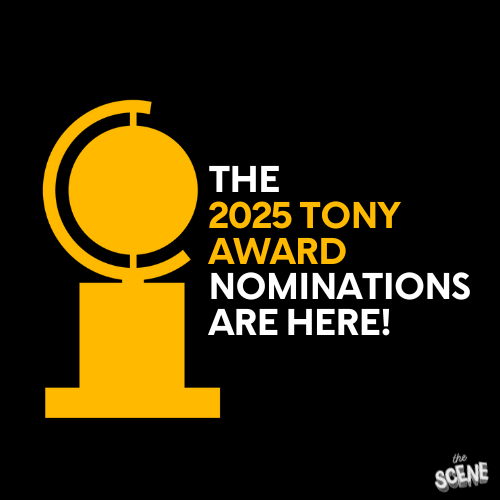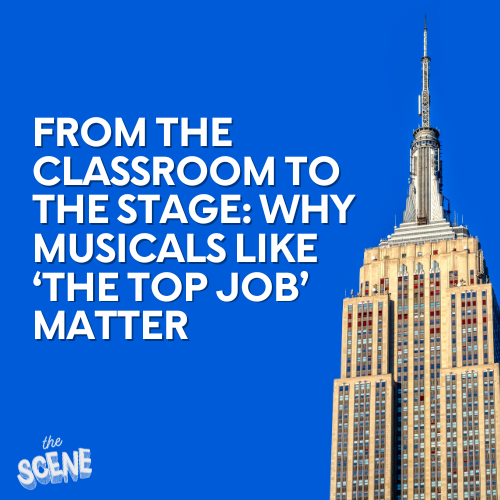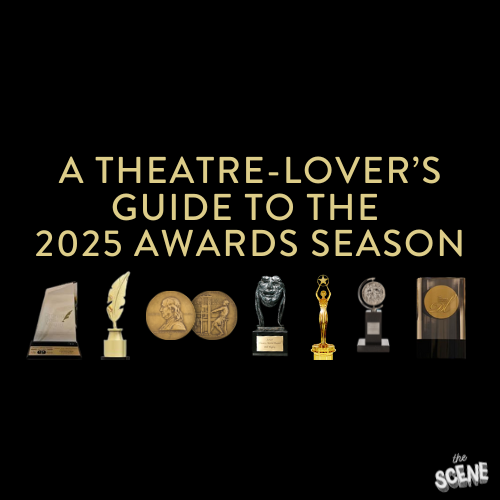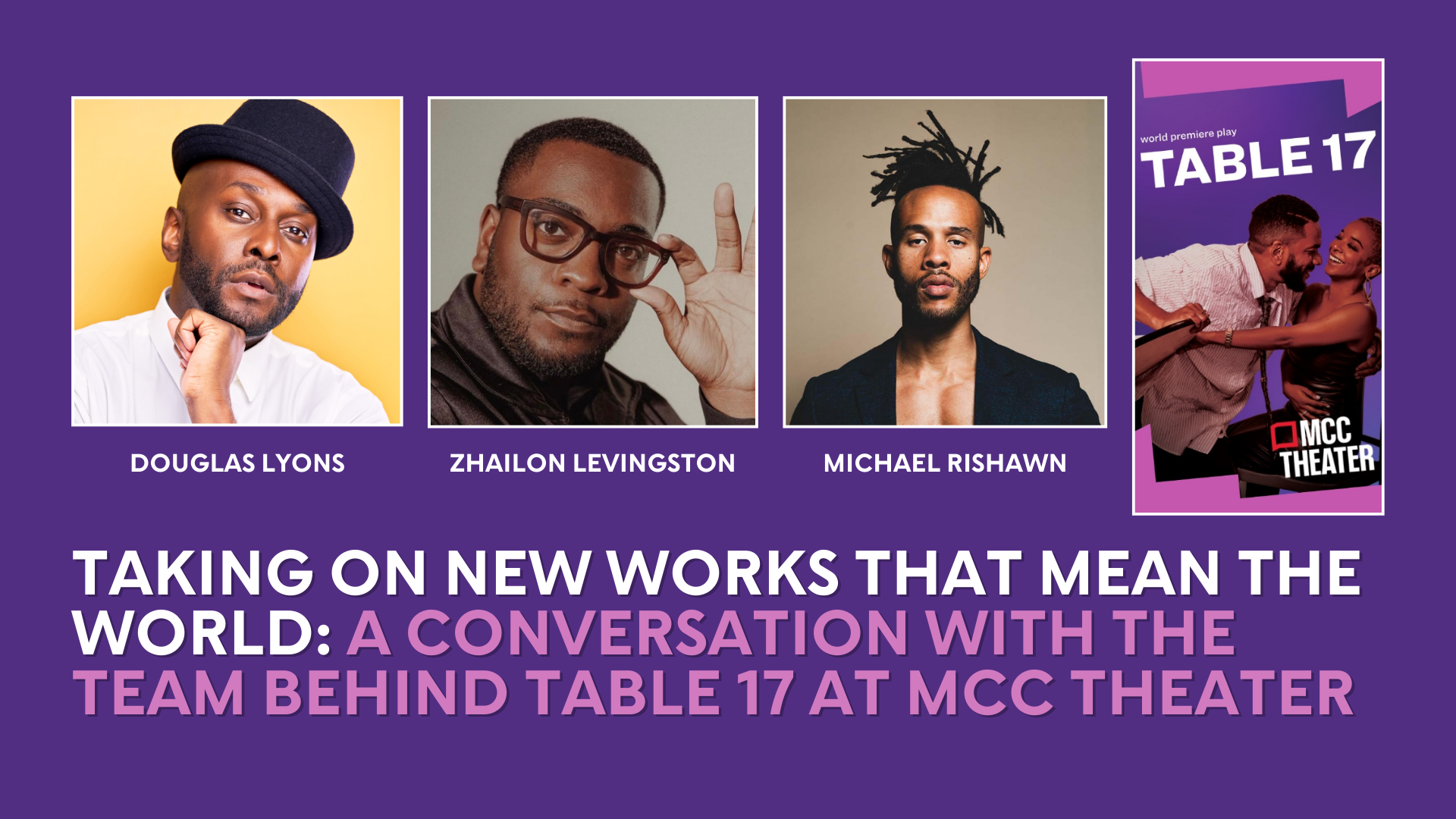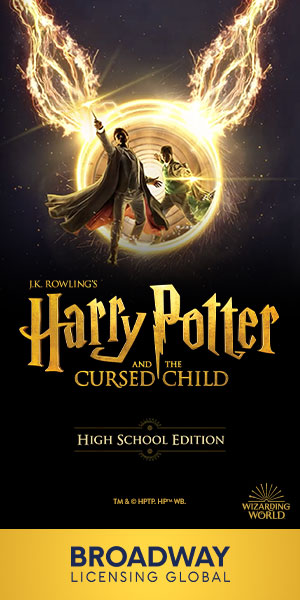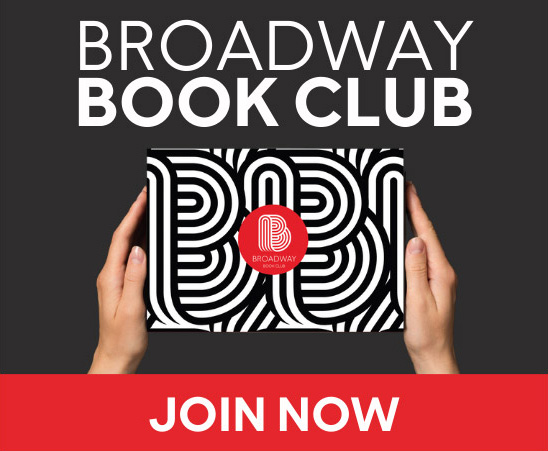by Justin Borak, The Scene
Creating new work is daunting and scary, especially when it means so much to you. Taking it on and putting it up on stage can be even more frightening, but when you have the perfect team around you, creativity flows, and magic is made on stage. That is very much the case with the new Douglas Lyons play, Table 17, which recently premiered and is currently running at MCC Theater in New York, NY.
Table 17 begins by asking a not-so-simple question: if your ex wanted to meet up again, would you? Previously engaged, Jada (Kara Young) and Dallas (Biko Eisen-Martin) have reunited for dinner to hash out the good, the bad, and the ugly from their romantic past. Despite the intrusion of sassy waiters, complicated memories, and their best efforts to keep things casual, the estranged couple find themselves cornered by the truth. Table 17 is a hilarious, sweet, open letter to love found, lost, and possibly reignited.
I recently sat down with Table 17 playwright Douglas Lyons (Chicken & Biscuits), Director Zhailon Levingston (Cats: The Jellicle Ball), and performer Michael Rishawn (Ain’t No Mo’) to discuss their world premiere play. The following conversation has been edited for length and clarity.
Justin Borak (JB): I need to start off and say the play was amazing. The story was so personal and deep. It was funny and heartbreaking. What inspired the creation of this show, and what went into making it?
Douglas Lyons (DL): So, there are these videos on YouTube and Instagram where exes literally sit down at a table with a camera crew and answer questions about their past relationship, about where they are now, and about their current feelings. Are they missing each other? What went wrong? I encountered these videos in early 2022, and at the time, one of my Instagram posts got the attention of Mark Cortale at New Works Provincetown. Mark messaged me, saying, “I love ‘Chicken and Biscuits,’ and I love your POV. I’m interested in commissioning you. Do you have any ideas?” I had just seen this clip of these exes, and there’s something inherently dramatic about two people sitting down trying to work out a love that didn’t work. So, I took the clip and emailed it to Mark, and when we had our first meeting, Mark and his team were like, we love this, we’d love to see what you’re gonna do with it. And I was like, uh -huh, uh -huh, I’m gonna do something. I didn’t know. But I was up for the challenge, and it just felt rich. It felt like love is something that’s so universal and so palpable and tangible for anyone who’s alive because you either have it or you want it.
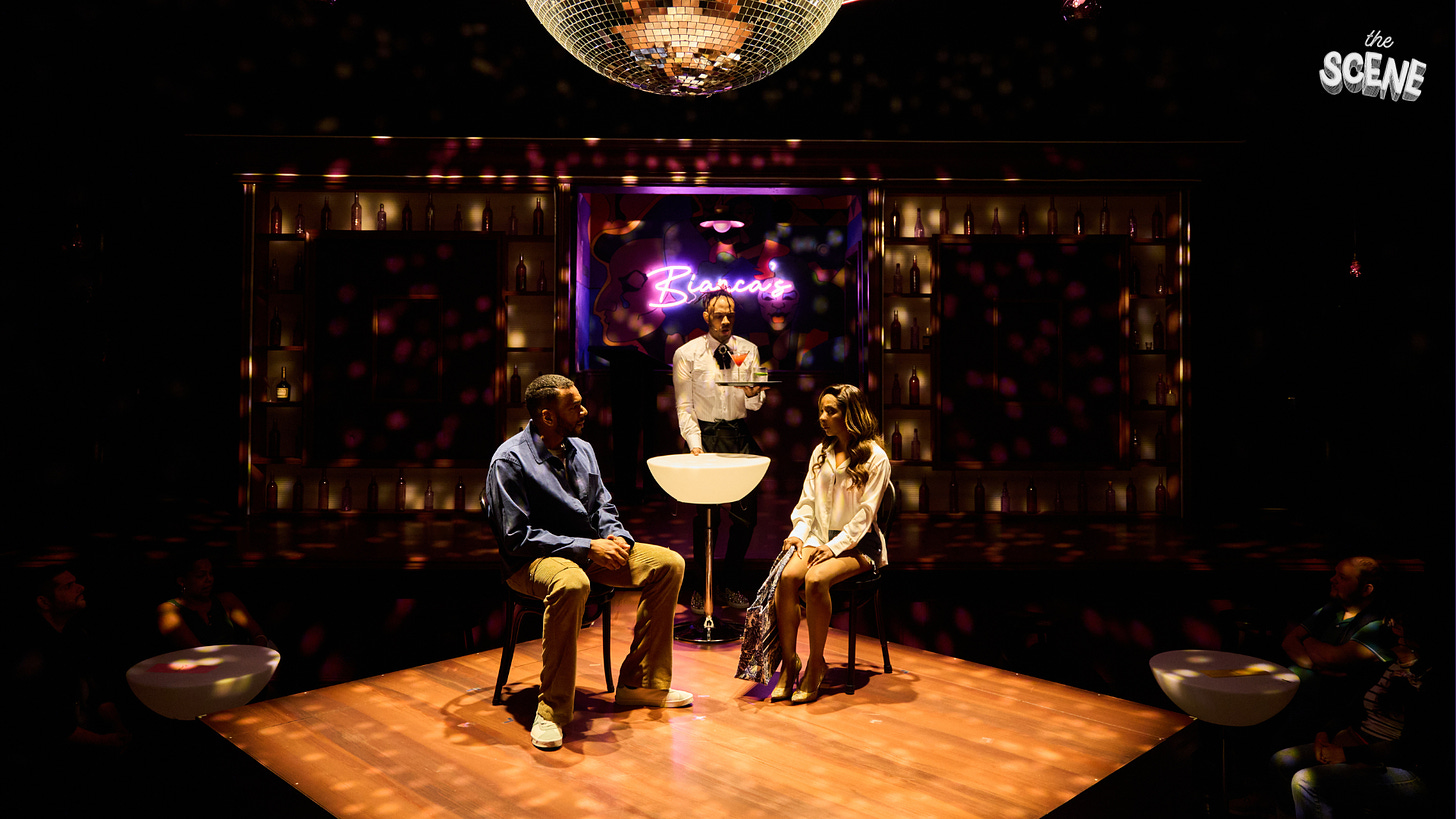
The Cast of Table 17 at MCC Theater | Photo by Daniel J Vasquez
JB: Zhailon, what made you want to direct the world premiere of this play?
Zhailon Levingston (ZL): A couple of things. First, the opportunity to collaborate with Douglas again. We created ‘Chicken and Biscuits’ together during the pandemic, which went to Broadway. And so, the idea that we could have some hindsight on that process and have gone off and done our own things and then be able to come back with newly developed craft to bring to this collaboration, which is now years long, is always an exciting prospect. And then Douglas sent me the first, however many pages of the play, which I thought was just charming and funny. And I thought the conceit was something we don’t see much in theater. I loved the idea that he was trying to honor this kind of period of the black rom-com that we don’t see as much in mass media. And this is what I say a lot about projects that I’m drawn to; at the center of it was a question I didn’t have the answer to. And that’s always exciting for me to be like, Oh, I don’t know how one does this; how do you move between memory and the present this quickly? And how do you take an audience along a cinematic ride? And how do you keep it very innately theatrical so that you’re not thinking about, you know, a different form while you’re there? So, all of those kind of big global questions about the event of the show itself were really attractive to me even before the script was finished.
JB: Douglas, do you want to discuss how those Black Romantic Comedies helped inspire Table 17?
DL: It was a vibe. There was a period in Black cinema when folks fell in love with the genre of storytelling with Black love, and we don’t really get that opportunity on stage. That genre of 90s Black cinema was so rich and informative of what we’re capable of. Black folks don’t often get the images of love in culture, so I was determined to make sure that happened in the theater. When you see Black bodies on stage, they are typically existing or breathing in reaction to racism, sexism, white supremacy, and struggle. Ragtime is one of my favorite musicals I’ve performed, and the Black people die in that show. They’re in love, but they die. That’s one of the most celebrated musicals in musical theater, but at what cost? So, it was my mission to create something that felt real and honored the love I see in a lot of my friends.
JB: Michael. What drew you to taking on this play as a performer? What gets you excited as an actor about working with new text?
Michael Rishawn (MR): Douglas approached me about the play when it was maybe 30 to 40 pages, but it wasn’t a finished play at that point. And he was like, “Hey, can you give voice to something I’m working on?” I was in Los Angeles, in between jobs, so I hopped on a Zoom with him and two other actors in LA. And the three of us gave voice to this seed of a play. I’ve always been a huge fan of new work, especially new work that is edgy and provocative and has a pulse that highlights issues that we, as human beings, are dealing with.
JB: Douglas, you have a unique perspective as a professional performer and playwright. How does being a performer affect your writing, and what do you see performers enjoy the most when picking up new text?
DL: I try to write things that I know will feel good to perform. My access point and offering to the American theater is joy and, more specifically, black joy and how that can permeate the industry and shine a light back towards the theater. So, I bring my experience doing Broadway shows, national tours, plays, and other things. Some shows are fantastic for the audience, but they’re not fun for the performer to experience. So, I bring my sense of humor to the work. And that’s what makes it unique. I didn’t go to Columbia or Juilliard, and I don’t have this mammoth resume. But what I do have is my lived experience, personality, and upbringing in the way that, in my household, comedy was an act of love. So, I pour that into my work.
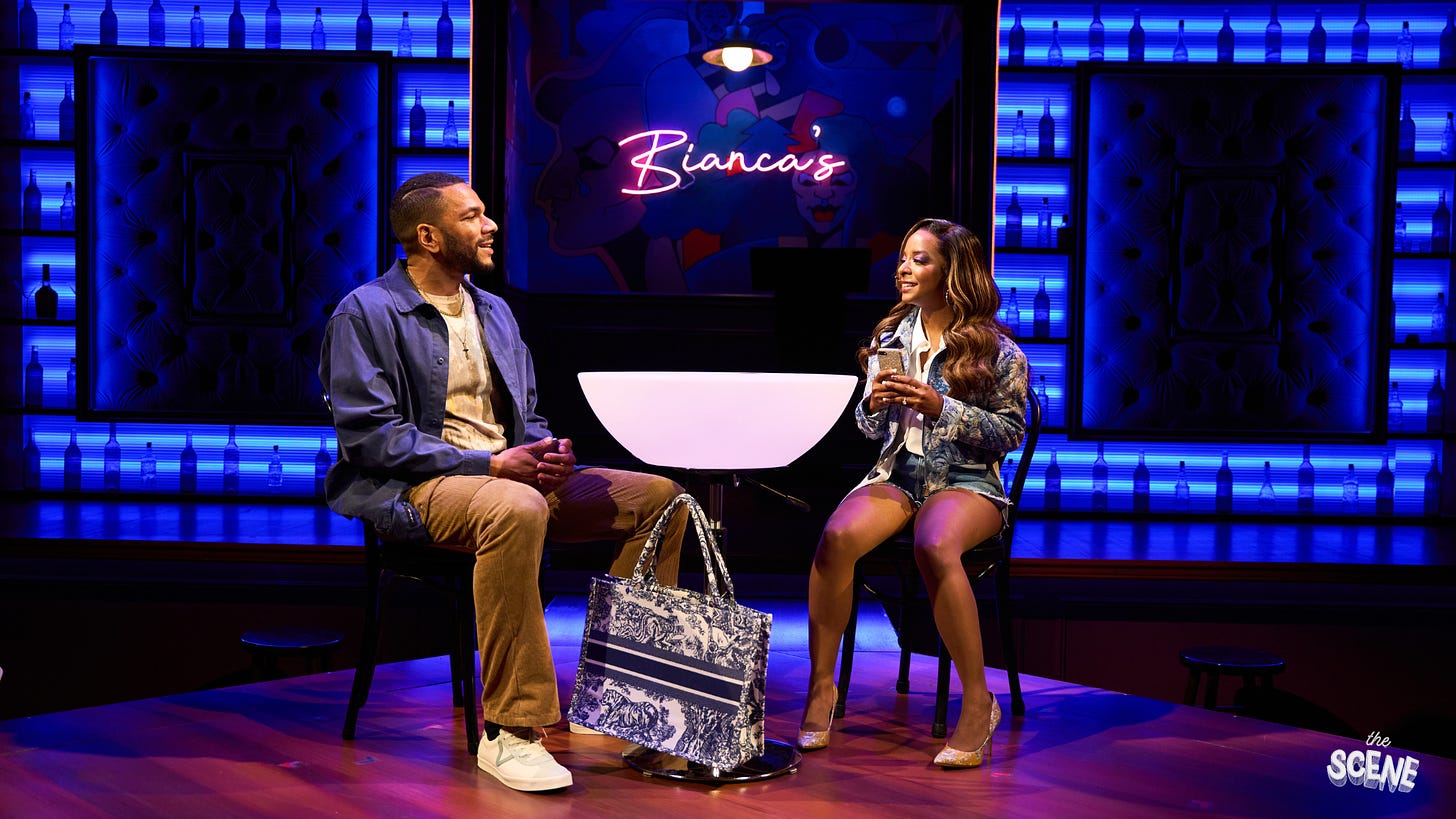
Biko Eisen-Martin and Kata Young in Table 17 | Photo by Daniel J Vasquez
JB: We see so many shows nowadays with people playing multiple roles, and in this show, you take on the hard job of playing every role outside of Jada and Dallas. What goes into your process as an actor needing to be able to flip characters on a dime?
MR: Oh, man. Sometimes, I still don’t know how I do it, but I think I exist in a place of truth with all three of those humans. River is a host and now the waiter, you’ve got the bartender, and then you’ve got Eric, a steward, and all of them are in service to people and to the lovers (Jada and Dallas). So, when it comes to the text, sometimes I hear them so distinctly, and then it’s my job to work to let them out of my instrument. And then sometimes it’s a physical thing. Sometimes, it’s what Kara (Young) gives me because she’s so porous as an artist. But it’s a testament to Doug’s writing because it is very clear. So, for me, I hear them specifically. And I think in this particular piece, I was able to sort of through hearing them, that’s the starting point that I’ve jumped off from for this particular play. I’m thrilled that people are responding to it the way they are. It seems people can identify with sort of either Jada or Dallas, River, or even Eric. And that’s a lovely thing to give to people, whether it’s a gift of healing or a gift of, you know, just being seen. It’s a true gift to be able to work on this piece.
JB: Now, this play explores the relationship of Jada and Dallas, and while we watch them reuniting after splitting up, we get so many flashbacks and moments within their lives outside of that dinner. We also see the audience immersion, whether dancing through the crowd or even making a drink for an audience member. This show explores a lot of different theatrical devices. What work was involved in planning to direct a script of this magnitude?
ZL: First, it was about picking a team of collaborators who I felt were up to the task. It isn’t just coming from me; one of the primary jobs of a director is to be a purveyor of tone, so finding the right group of people who could create the tone of this piece, both in its kind of muscularity and just kind of in its energy itself, was paramount. It’s working with Ben Stanton, the lighting designer with an inherently cinematic pulse to his lighting, or with Jason Sherwood, our incredible set designer whose work enchants me but is also very rigorous in a certain way. I could continue down the line, but it’s really about having this incredible creative team who was down for the challenge, people as excited about, you know, the kind of unknowns as I was. Another thing I would say is that this play is about a few different types of things, all at the same time. So, keeping that at the center of many creative conversations was important. It’s stand-up comedy, it’s dinner theater, and it is almost a group therapy session. You know, it’s all of these different kinds of modalities that the actors have to switch in and out of super quickly. Sometimes, they have to drop in, like being in a traditional kind of Stanislavski back-and-forth two-person theme. And then there are moments wherein they are like live editing a heightened fight for you, wherein their mind has to be doing multiple things simultaneously, not just dropping into the character they’re playing. And then there are times in which they’re talking to the audience. And I believe in a theater of consequence, wherein the fourth wall is rather malleable. So, you can come to the show and sit back, fold your arms, and get some layers. The show can exist and survive with that level of engagement. But the more you lean in, the more you unfurl your arms, the more you engage with it. It’s just the more that is there for you. And so, there’s a choose your own adventure to the vibe of the space and in the event, even though everyone’s all in the same room watching the same thing at the same time and creating those kinds of events, which I think is also true of Cats (Cats: The Jellicle Ball) I think it was also true of Chicken and Biscuits. That kind of theatre can be challenging, but it’s thrilling to me.
JB: Douglas, one thing I love about your writing is the mix of comedy and drama. Your plays always make me feel a whole gamut of feelings throughout the runtime. Where did you learn to write? Were there teachers in your life or other playwrights that inspired you?
DL: Viola Davis is one of my favorites to study. I’m obsessed with Kiki Palmer, currently, because she has a freedom, she hosts things, she acts in things. She makes music like she is living, breathing, multi-hyphenate, but she brings so much joy into everything she does. And I think what Zhailon kindly has said about my work is like, when you sign up for Douglas Lyon’s play, you know, you’re going to feel good, you know, you’re going to have a good time, right? And so, this idea of the play and the work being an event of happiness in a world so dark, if that’s my brand, I can die with that, like I’m good with that. I don’t think the theatre likes to be clever and intelligent more than relatable. And what makes TV work is that you’re not sitting there being like, “Oh, I don’t get this.” It’s so emotionally accessible that you want more. And I think that is my writing. I want you to feel like you know the people; they’re hugging you, or they remind you of someone you know, and you want to spend more time with them.
JB: So many performers look back and wish they had heard something in the classroom or known something before getting to where they are. If you had the chance, what would you tell young Michael about this industry and this career path?
MR: Oh, my God. Big question. I would tell him to be clear about what he wants from pursuing this but also stay flexible to the universe creating alongside you. I think that the universe loves a stubborn soul, and this business is extremely hard. I think being a creative is extremely hard to do because it’s an unconventional job, but staying in it, putting in those 10,000 hours, working your passion, working your craft, the things will come. You don’t necessarily have control over how it looks. Be clear so you know your path, but also be open and flexible to how it unfolds.
JB: Directing a piece with this much movement and so much going on can be daunting. What advice would you give to the director thinking about taking on a more challenging piece of theatre for their school season?
ZL: Theatre, though changing in many different ways, is not getting any easier. The kind of conversations that artists are having, the type of shows that are being programmed, are not requiring less and less rigor. They may be contextualized in either more overtly commercial or less commercial ways. They may be adaptations from movies. They may be original material from someone no one’s ever heard of, a first-time playwright, but we’re living in a landscape where your ability to walk into any room and be able to do the job is the most valuable quality and even more valuable than the stamina that it needs, the stamina that it takes to continue to wake up every day and create a standard for success for yourself that forces a level of integrity in the work. So, the easiest way to put yourself in that situation is always to be working on something hard, something that scares you. Something that, at the center of it, is a question mark. In a very practical way, one of the guiding prompts of Table 17 is how do we create a show wherein you walk into the theater, and you’re unclear about where the narrative will come from? Where you don’t know how are you going to see a play tonight? “I get this vibe. I get that we’re all in here together. I get that we’re hanging out. I get that it’s a date night. I get that the music is vibe. But you’re going to tell me a full story in here? You’re going to take me places? How are you going to take me places? How are you going to do that?” And so, I didn’t have the answer to that question for a long time, a long enough time for the project to remain scary. I would say that earlier, we were exposing young artists to work of real rigor despite, its either popularity or not, the more we’re preparing them for a theatrical landscape that has never slowed in terms of what it will be asking of.
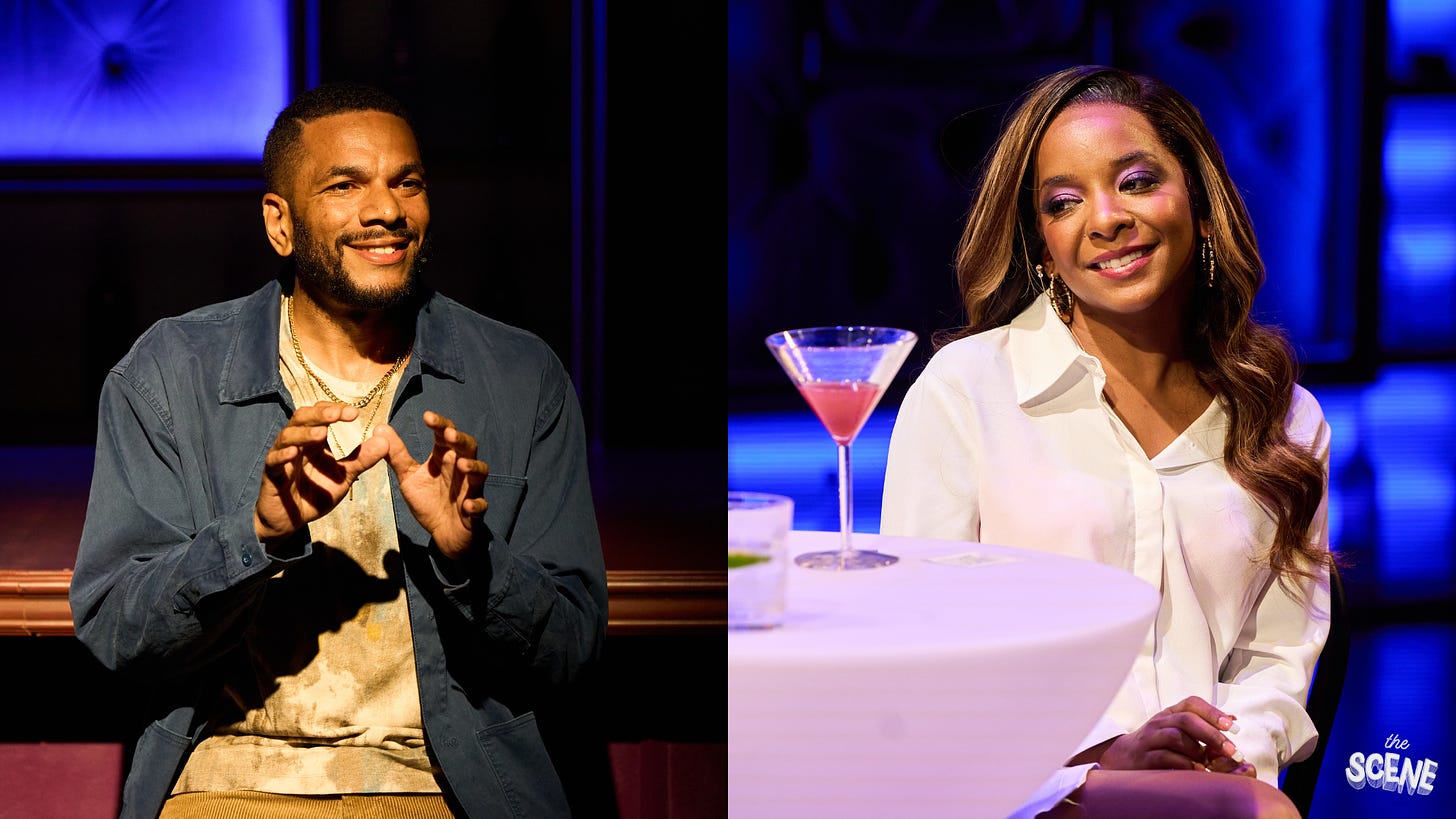
Biko Eisen-Martin and Kara Young in Table 17 | Photos by Daniel J Vasquez



